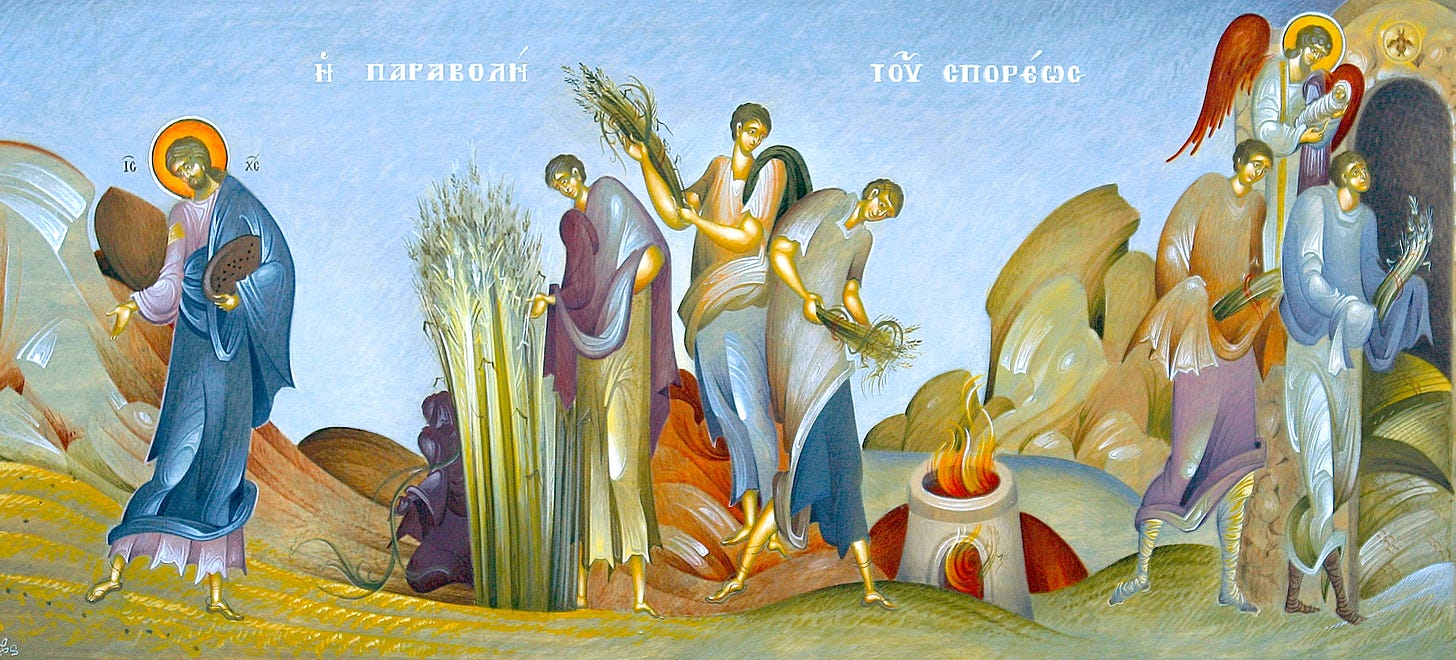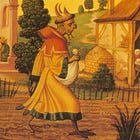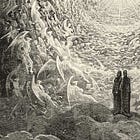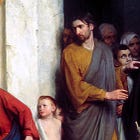Why does God tolerate evil and heresy?
And why does the Church sometimes refrain from condemning such evils too?

Why do God and his Church sometimes refrain from condemning heresy and other evils?
In this chapter, Fr Coleridge tells us…
Why God tolerates evil, and how he deals with it
How the existence of heresies can be good for the Church
How God, the Church and Society deal with heresy and heretics.
Most of all, he shows us…
This is the second half of Fr Coleridge’s commentary on this passage. Here is the first:
The Parable of the Cockle amid the Wheat
From
The Training of the Apostles Vol. III
Fr Henry James Coleridge, 1884, Ch. IX, pp 159-69
St. Matt. xiii. 24–28, 36–53
Story of the Gospels, § 59-62
Sung at the Fifth Sunday after Epiphany and in one of the “spare” Sundays before Advent.
Why do you think the Church uses this event for this part of the liturgical year? Share your thoughts in the comments below.
Evil and the Kingdom of God
The enemy of God and man will not be excluded from making his malignant attempts on the fair field of the Church, as he was not prevented from assailing the beautiful and innocent creation of God when man was first made.
The evil which sin has introduced into man remains in the Kingdom of God as long as the time of probation lasts, that is, the conflict of the flesh and the spirit is to go on even in regenerate man, although immense forces of grace have been supplied to him for his easy victory in the conflict. And so neither is the activity of the evil spirits fettered or put an end to, though men are wonderfully stronger for resistance against these deadly enemies than they were before the coming of our Lord.
As a consequence of these two truths, the field of the world in which the good seed has been sown is to be still what it always was, a field in which good and evil grow up side by side, nor is there to be any part of it in which the work of the evil one is not to be rewarded by a kind of miserable success of its own.
How will God deal with it?
But then, the question rises up—it must certainly have risen up in the minds of the angels as they watched the progress of the Gospel Kingdom—how will God deal with the evil shoots which have covered so large a space on this field which He has sown and is to be continually sowing?
When evil sprang up in Heaven, God did not tolerate it. The evil shoots were uprooted at once and cast away. Even in the history of His dealings with man, the principle of swift vengeance and extermination has not unfrequently been followed.
Once the whole race of man was destroyed, except eight persons, and there had been other instances of summary chastisements, only less signal than that.
What is to be the law of God’s action in the government of His Church, or of the world into which He has sent forth His Church?
The commentary was originally just for members. NOW IT IS OPEN TO ALL READERS.
But here’s why you should subscribe to The Father Coleridge Reader:
Coleridge provides solid explanations of the entirety of the Gospel
His work is full of doctrine and piety, and is highly credible
He gives a clear trajectory of the life of Christ, its drama and all its stages.
If more Catholics knew about works like Fr Coleridge’s, then other works based on dubious private revelations would be much less attractive.
But sourcing and curating the texts, cleaning up scans, and editing them for online reading is a labour of love, and takes a lot of time.
Will you lend us a hand and hit subscribe?
Answer of our Lord
The answer to this question is contained in the reply of the householder to the servants who volunteer to go at once and root up the cockle.
‘Wilt thou that we go and gather it up? And he said, No, lest perhaps gathering up the cockle, you root up the wheat also together with it. Suffer both to grow together till the harvest, and at the time of harvest I will say to the reapers, Gather up first the cockle, and bind it in bundles to burn, but the wheat gather ye into my barn.
‘The harvest is the end of the world, and the reapers are the angels. Even as cockle is therefore gathered up, and burnt with fire, so shall it be at the end of the world.
‘The Son of Man shall send His angels, and they shall gather out of His Kingdom all scandals, and them that work iniquity, and shall cast them out into the furnace of fire; there shall be weeping and gnashing of teeth.
‘Then shall the just shine as the sun in the Kingdom of their Father.’
Toleration of evil—future retribution
It is remarkable, in the first place, as to this answer of the householder in the parable, that our Lord in His explanation does not give any commentary which answers directly to the words, ‘lest gathering up the cockle you root up the wheat also together with it.’
He dwells mainly on the final separation, and on the fate of the cockle, gathered into bundles to be burned, as if it was more important to enforce on the minds of His hearers the truth of the final chastisement of the scandalous and the wicked, than that other truth of their toleration in His Kingdom, and of the reason which is given for that toleration.
He seems almost to take it for granted as a thing not to be wondered at, that there should be scandals which are not at once eradicated, and to wish to point more forcibly to the future destruction of all offences and the thorough purgation of the Kingdom. For the toleration of evil is a principle already established in His government of the world, and therefore it was not to be expected that any change in this principle should be made as long as that human world goes on in its present provisional state.
But in the former parable He had said nothing of the future judgment. He had spoken simply of the various causes of the sterility or failure or fertility of the good seed, as if there had been no responsibility for all these various issues on the part of those in whose hearts the seed had been sown. This new feature in the whole picture, therefore, was yet to be supplied.
But in the second place, although our Lord’s own commentary seems thus to leave aside the reason assigned for the refusal of the householder to consent to the immediate rooting up of the cockle, it cannot be wrong for us to suppose that there are Divine reasons for that toleration of the evil shoots which is the characteristic of the present providence of God.
Thus we find the Fathers of the Church explaining for us in more than one way the words of the householder on which we are now engaged.
Evil may be made good
We may insist, however, so far on the silence of our Lord, with regard to the meaning of this first part of the answer of the householder, as to see in it the truth that one prominent reason for the forbearance which is inculcated on the servants lies in the certainty of the future retribution on all that can cause scandal or offence in the Kingdom of God.
The punishment is only delayed, the perfect purgation of the field of God is only put off for awhile. That being the case, it remains for the prudent householder to deal with the cockle as he thinks best in his own interest, that is, in the interest of the wheat.
For the sake of the wheat it is that the cockle is to be spared awhile. If the cockle is rooted up, the wheat may suffer. It may be rooted up with the cockle. In the growth of which the seed is the Word of God, in the growth in which the good seed are the children of the Kingdom, it is quite clear that a reason exists which cannot be expressed in the same image which is here used by our Lord.
For cockle cannot become wheat, nor can wheat become cockle. But the good can become bad, and the bad can become good. Thus, the immediate rooting up of the cockle might have cost our Lord the souls of such saints as St. Magdalene and St. Paul. And it is a part of the chief duties of the servants of God in the Apostolical ministry to be constantly labouring, in the spirit of the Good Shepherd, to turn the cockle into the wheat.
Advantage from the existence of heresies
But, apart from this reason, one which could not be expressed in this parable by our Lord without a change of imagery, there are sufficient reasons assigned by the Fathers for the toleration of the cockle by the side of the wheat, even if the cockle is never, by conversion, to become the wheat.
For the existence even of scandals and heresies and divisions among the subjects of the Church is of use, as the Apostle says,1 in order to the manifestation of the faithfulness of those who are faithful. Too many bright examples of suffering heroically for the sake of God would be lost, if He were to interfere by an exercise of His power in the destruction of the rebellious and the schismatical.
Again, the presence of the wicked, and even of the scandalous, in the body of the faithful, is a constant stimulus to the virtue of the faithful. It gives them great objects to pray for, and to toil for before God. It also makes them watchful over themselves, and so must secure their virtue in many cases in which they might fall through negligence if there were nothing to warn them.
Again, the wicked and the authors and abettors of heresies, are often singularly active and devoted in the pursuit of the objects which they have at heart, and in this way also they serve as spurs and examples to the children of the Kingdom.
In another way also the tolerance of the wicked on the part of God is of immense use to the children of the Church. For if it were not so ordained in His Providence that those who sin against Him should be spared, it would follow that all who are spared are in a state of grace, and might feel confident of their own safety. Nothing would be more mischievous than this, for it would breed immense and false security, as much almost as if people could feel certain beforehand of their own perseverance, and of their dying a good death.
These things are left uncertain by God for the sake of the elect, and if He did not leave the cockle in the field until the end this merciful design of His would be defeated.
Objection against the Church’s discipline
Our Lord is speaking of the Providence of God by which the economy of redemption is governed, and which can afford to wait for the time of inflicting punishment, because it has all times at its disposal. This seems to be the answer to the objection against the discipline of the Church, which has sometimes been founded on this parable, as if it were contrary to the rule here laid down by our Lord for the rulers of the Church to punish, in the manner in which punishment is within their power, those who give public scandal in the Church, or in other ways violate her laws.
The discipline of the Church is both corrective of the offenders whom she punishes, and also wisely ordered for the common benefit. Our Lord Himself gave instructions as to those who would not obey the Church, that they were to be treated as heathens and as publicans.2
St. Paul forbade the Corinthians to hold intercourse with those Christians who were guilty of certain sins, and enjoined on them the excommunication of the incestuous person.3 In his First Epistle to St. Timothy he mentions Hymeneus and Alexander, whom he says he has delivered to Satan, that is, excommunicated.4
And in those early times it seems to have been no uncommon thing for excommunicated persons to have been actually possessed by the devil after the sentence of the Church. And there are other passages in the New Testament which seem to bear witness to the very early introduction of the salutary discipline of which we speak.
The uprooting which is, in this parable, deferred by the order of the householder is that which is to take place inevitably in the Last Day. And as the last day to each soul is the day of its own death, it may in particular cases be anticipated by the infliction of sudden death by the judgment of God.
Such was the case with the first great scandal in the Church, in the instance of Ananias and Sapphira, who were slain by the visitation of God as soon as St. Peter had passed on them his sentence of condemnation.
Punishment of heretics—why the Church sometimes refrains
The question of the punishment of heretics by a Christian state is not the same as that of the ecclesiastical use of disciplinary punishment. For in the Christian system of civil government, the crime of heresy is a crime against the common good, and not only against the spiritual order.
The arguments drawn from this parable against the Donatist and Novatian heretics by the Fathers who were engaged in those controversies, cannot be questioned. But they only go to prove that the visible Church contains the evil as well as the good, which was what those sectaries denied, not that there is no such crime as heresy or schism which may be punished by the Church as treason and rebellion are punished by the State.
It is still true that, even in the administration of these remedies in the cases just now mentioned, the Church is extremely careful lest the one great end of the benefit of the faithful should be endangered. For she often forbears to use her powers, when she sees that the use of them may do harm rather than good, and provoke a more formal rebellion instead of correcting an evil which is but in its infancy.
This is probably one reason why formal excommunications are so comparatively rare in modern times, when the authorities of the Church have reason for thinking that the mass of the population in some Catholic country will not be able to take its own part in carrying out the sentence. For in that case others, besides the direct offenders against whom the sentence is hurled, will be involved in sin from which they would otherwise be free.
In such cases the Church is fain to dissemble, and be as if she did not hear or see, rather than hurry on a catastrophe which may involve thousands of her children in the danger of the loss of their souls by disobedience to her plain commands.
The evil gathered from among the good—angels at the end of the world
Some things remain to be noticed by way of conclusion with regard to the explanation of this parable by our Lord.
In the first place, He describes the angels as sent forth by the Son of Man, who are to gather out of His Kingdom all scandals and them that work iniquity. For whether the field in which the seed is sown be considered as the world or as the Church, as it may be considered to be either, in different aspects of the same truth, it is in each case the Kingdom of the Son of Man, the Kingdom which belongs to Him by virtue of His Incarnation, the Kingdom which He has conquered back to Himself by His Passion, and which has been given to Him in His glorious Resurrection.
Thus, even if it were true that at the end of time the scandalous and the workers of iniquity were to be found the majority, still they would be gathered out of His Kingdom as intruders and invaders, and the just would remain therein as in their true home and heritage.
Thus we need not press too far the apparent argument which may be drawn from these words as to the comparative numbers of the just and the unjust. The words of our Lord seem to refer to His former words in the Sermon on the Mount, where He had said that He would say in the Last Day to many who would claim to have prophesied in His name, and in His name cast out devils and done many wonderful works, that He knew them not, ‘Depart from Me, you that work iniquity.’
The cockle bound in bundles
Again, it is clear that He here distinguishes between two kinds of evil which shall be alike eradicated in His Kingdom, the evil of open scandal and the evil of the working of iniquity, which may not be open to the eyes of men but which is open to the eye of God. Such was the case of the workers of iniquity of whom He had spoken in the Sermon on the Mount, as just quoted.
Again, it has been noted by some writers on this parable, that the cockle is to be bound in bundles to be burnt, as if our Lord would turn our thoughts to the accurate discrimination, even in the punishments as in the rewards of the next world, and to remind us that sinners of similar kinds will be punished together, as they are represented in the great Christian poem of the middle ages.
And it is also remarkable that our Lord adds to the description of the burning of the wicked in the furnace of fire, the words, ‘then shall the just shine as the sun in the Kingdom of their Father.’ Such words imply that in the future state of blessedness there shall be no concealment of virtue and spiritual beauty, whereas in the present state of things we are not only unable to see such glories as are interior to the soul, but also we are hindered, by the companionship of the bad with the good, and the consequent corruption of public opinion, from recognizing even those excellencies and perfections in virtue which would be not altogether beyond the ken of the discernment of which we are at present masters, if it were not for the overclouding of the good by the presence of the bad.
Manifestation of the just
But the greatest cause of that manifestation of the just and of their spiritual beauty, which will then take place, will be the new state and condition in which all will live who have a share in that blessed Kingdom of the Father.
For in that state there will be no longer any concealment of hearts and minds, but the whole interior of the soul of each one of the citizens of Heaven will be laid open to all. This manifestation will have begun at the Day of Judgment, one of the great features of which will be the opening of all consciences and of all lives, as well as of the dealings of God with all and the gifts which He has bestowed upon each.
This itself will be enough to furnish the blessed dwellers in Heaven with matter for thanksgiving to God and for perpetual contemplation and enjoyment. It will be the laying open of the full knowledge of a universe far more splendid and magnificent and various in its beauties than the physical universe, the knowledge of which is capable of imparting to us intellectual enjoyments of the rarest and highest kind. It is not surprising that the Sacred Heart of our Lord should have led Him here to touch on this point, which must be the source of endless delight to Him.
He seems to touch on it here, rather for the purpose of encouragement, and as if to promise to those who shall remain faithful under the disadvantages of the present mixture of evil with good in the world, a reward which will more than compensate to them for all they may have had to endure. And perhaps the words also include the thought that the splendours of the virtue of the just in the future Kingdom of God will be enhanced rather than diminished by the obscuration and persecution which they have had to undergo, for their virtue will have been made perfect in patience and thus the glory of their crowns increased.
There is something of the same connection to be observed in the passage in the Prophet Daniel, which was probably in the mind of our Lord as He spoke this parable. ‘Many of those that sleep in the dust of the earth shall awake, some unto life everlasting, and others unto reproach, to see it always. But they that are learned’—that is, just—‘shall shine as the brightness of the firmament, and they that instruct many to justice as stars for all eternity.’5
And our Lord seems to have wished to lead the Apostles, to whom He was explaining the parable, to dwell much in thought on the great reward thus promised to them, and to make the glory of the blessed, both in body and soul, a great motive for exertion and faithfulness in their service to His Father. For He adds here again, as if for them specially, His familiar exhortation, ‘He that hath ears to hear, let him hear.’
From Fr Henry James Coleridge, The Training of the Apostles Vol. III
Here’s why you should subscribe to The Father Coleridge Reader:
Coleridge provides solid explanations of the entirety of the Gospel
His work is full of doctrine and piety, and is highly credible
He gives a clear trajectory of the life of Christ and all its stages.
If more Catholics knew about works like Fr Coleridge’s, then other works based on sentimentality or dubious private revelations would be less attractive.
Sourcing and curating the texts, cleaning up scans, and editing them for online reading is a labour of love, and takes a lot of time.
Will you lend us a hand and hit subscribe?
Read next:
Follow our projects on Twitter, YouTube and Telegram:
1 Cor. xi. 19
St. Matt. xviii, 17.
1 Cor. v, 11, 13.
1 Tim. i. 20.
Daniel xii. 3.






